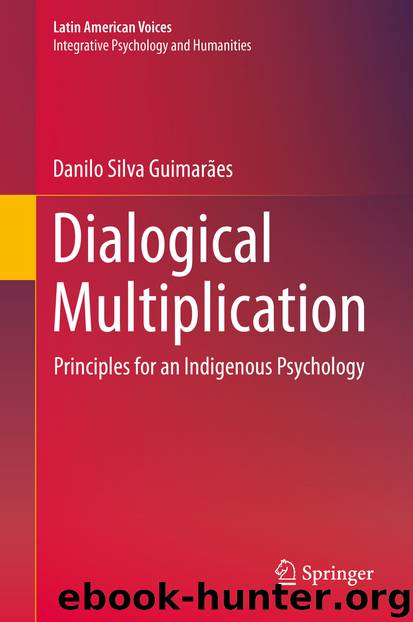Dialogical Multiplication by Danilo Silva Guimarães

Author:Danilo Silva Guimarães
Language: eng
Format: epub
ISBN: 9783030267025
Publisher: Springer International Publishing
Dialogical analysis, therefore, starts from the mediated relations between the self and the others in a concrete extra-verbal situation. In the communicative situation, the whole of thought is segmented and re-integrated, in a dual process involving tensions. Our perception works from an initial Gestalt, followed by the decomposition of the whole in its interdependent parts. In communication, verbal elements are reorganized in a whole from the elements of experience that were fragmented by the thought process. To understand this dual process, I contrasted the descending, analytical trajectory of internalization of experience to the ascending, interpretative trajectory of externalizing action and communication. I propose this contrast can also be used as a methodological tool to identify relevant tensions in the process of organizing cognitive-affective experiences.
I highlight, furthermore, the role of unshared dimensions in dialogue. Vygotsky (1934a/2001) speaks of “the presence of a hidden purpose, a subtext” (p. 341) in thought and language processes. This assumption suggests the non-coincidence of the descending and ascending trajectories in knowledge construction. This irreconcilable gap requires creative interpretations to fill in for the meanings that have not been explicited. Meanings acquire new forms in this way. Therefore, the unshared dimensions in dialogue provoke a creative immersion in the communicative process. Multiple trajectories for meaning may emerge in this process.
Absolute lack of sharing between the self and its others, when intentional, may function as a protection against hostile invasions. From an ethical point of view, it is a strategy for emancipation. The dialogical restriction in the access to secretive dimensions of the self shows alterity’s central role in psychological development; it is essential to sustain creative responsivity in the I-other-world relations.
Dialogue is coauthorship rather than intersubjectivity, precisely because it demands movement from the other, compromised action. Sobral (2014) emphasizes that “The Circle [Bakhtin’s] sees the subject not as a puppet in social relations, but as an agent, an organizer of discourses, responsible for their own acts and responsive to others” (p. 24). To Bakhtin (1929/2013), dialogism is the opposite of monologism. Bahktin rejects solipsism, which is a characteristic of the Cartesian subject. With his method of achieving truth, questioning the existence of all things, Descartes (1641/2004) concluded that the first unquestionable certainty is that “when I doubt, I think; if I think, therefore I am”. All things conceived that are external to myself can have their existence questioned, can be the illusion of a deceiving God, but the thoughts I have about these things are in me and, therefore, prove my existence. The Cartesian I is thus constituted of its representations of the world, legitimating its existence with its own thoughts (see also Leão and Guimarães, in preparation). The Cartesian I is thus constituted of its representations of the world, legitimating its existence with its own thoughts.[…] monologism is the radical denial of the existence of another isonomous and isonomo-responsive conscience outside itself, […]. In the monological approach (in its extreme or pure form), the other remains only an object of conscience, and not another conscience. The
Download
This site does not store any files on its server. We only index and link to content provided by other sites. Please contact the content providers to delete copyright contents if any and email us, we'll remove relevant links or contents immediately.
Rewire Your Anxious Brain by Catherine M. Pittman(18644)
Talking to Strangers by Malcolm Gladwell(13350)
The Art of Thinking Clearly by Rolf Dobelli(10455)
Mindhunter: Inside the FBI's Elite Serial Crime Unit by John E. Douglas & Mark Olshaker(9324)
Becoming Supernatural by Dr. Joe Dispenza(8204)
Change Your Questions, Change Your Life by Marilee Adams(7761)
Nudge - Improving Decisions about Health, Wealth, and Happiness by Thaler Sunstein(7693)
The Road Less Traveled by M. Scott Peck(7594)
The Lost Art of Listening by Michael P. Nichols(7494)
Mastermind: How to Think Like Sherlock Holmes by Maria Konnikova(7323)
Enlightenment Now: The Case for Reason, Science, Humanism, and Progress by Steven Pinker(7306)
Win Bigly by Scott Adams(7184)
The Way of Zen by Alan W. Watts(6601)
Daring Greatly by Brene Brown(6504)
Big Magic: Creative Living Beyond Fear by Elizabeth Gilbert(5756)
Grit by Angela Duckworth(5605)
Ego Is the Enemy by Ryan Holiday(5415)
Men In Love by Nancy Friday(5234)
The Laws of Human Nature by Robert Greene(5177)
